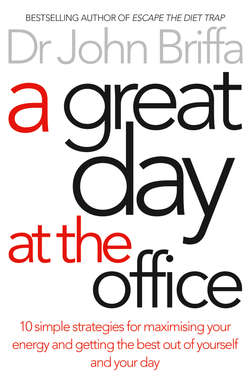Читать книгу A Great Day at the Office: 10 Simple Strategies for Maximizing Your Energy and Getting the Best Out of Yourself and Your Day - Dr. Briffa John - Страница 30
Sensitive Issues
ОглавлениеIt’s well-recognized that specific foods can sometimes trigger unwanted reactions in the body. In their most extreme form, these can take the form of allergic reactions known as ‘anaphylactic shock’ that can be life-threatening. However, other types of reactions to food can occur too that, although not as obvious, can nonetheless have debilitating effects on wellness and health. While any foodstuff may do this, grains are a common cause of problems in practice.
Grains contain proteins known as ‘lectins’ that are difficult to break down in the gut and can trigger problems with food sensitivity. This situation is made worse by the fact that grains also contain what are known as ‘protease inhibitors’ that impair proper breakdown of proteins, including lectins. The end result is that lectins can remain relatively intact and can then be absorbed into and even through the gut wall, subsequently to be recognized as something ‘foreign’.
This can cause the body to react in ways that may manifest themselves in the form of digestive strife (including pain and bloating), or problems beyond the gut such as headaches, asthma and eczema.
Of the grains, the one that I find particularly troublesome in this respect is wheat (found in, among other foodstuffs, most forms of bread, breakfast cereals, biscuits, cakes, pastries, pasta and pizza). Wheat is particularly rich in gluten – a protein that can trigger adverse reactions in the body. Some individuals have extreme sensitivity to gluten in the form of what is known as ‘coeliac disease’. However, there is good evidence that it is possible to be sensitive to gluten even if tests for coeliac disease have proven negative.13,14
In my experience, sensitivity to wheat and/or gluten is quite common, and frequently manifests itself as fatigue. This, in addition to a tendency to disrupt blood sugar levels, is another reason why eating something bread-based at lunch might lead to someone feeling tired or possibly ‘knocked out’ in the afternoon. If you ever find yourself wondering why you are struggling to get any real work done at this time, it might have something to do with that sandwich or foot-long baguette you ate at lunch. I once got chatting to a nutritionist at an obesity conference I was speaking at, and the subject strayed into the problems that can ensue for working people who eat something bread-based for lunch. ‘Death on the high street’ she called it.
To summarize, grains:
1 Are generally disruptive to blood sugar levels in a way that predisposes to fatigue, mood problems, waking in the night, hunger and sweet cravings
2 Tend to induce surges of sugar and insulin that predispose to issues such as weight gain, type 2 diabetes and heart disease in the long term
3 Are generally un-nutritious
4 Don’t seem to have an important role in maintaining bowel health and regularity
5 Contain phytates that impair the absorption of key nutrients
6 Can be rich in lectins and gluten that may provoke a range of symptoms including digestive discomfort, bloating and fatigue
With all this in mind, does it really make sense for these foods to form the cornerstone of our diets, as governments and health professionals usually advise?
Does all this bad news mean we should eat no grain at all? Not necessarily. Some individuals do seem to tolerate grain products reasonably well, in my experience. But, overwhelmingly, I find that when individuals eat less of these foods (or none at all), they are almost always rewarded with benefits in terms of changes such as weight loss, improved disease markers (see below) and, crucially, a sense of heightened vitality.
